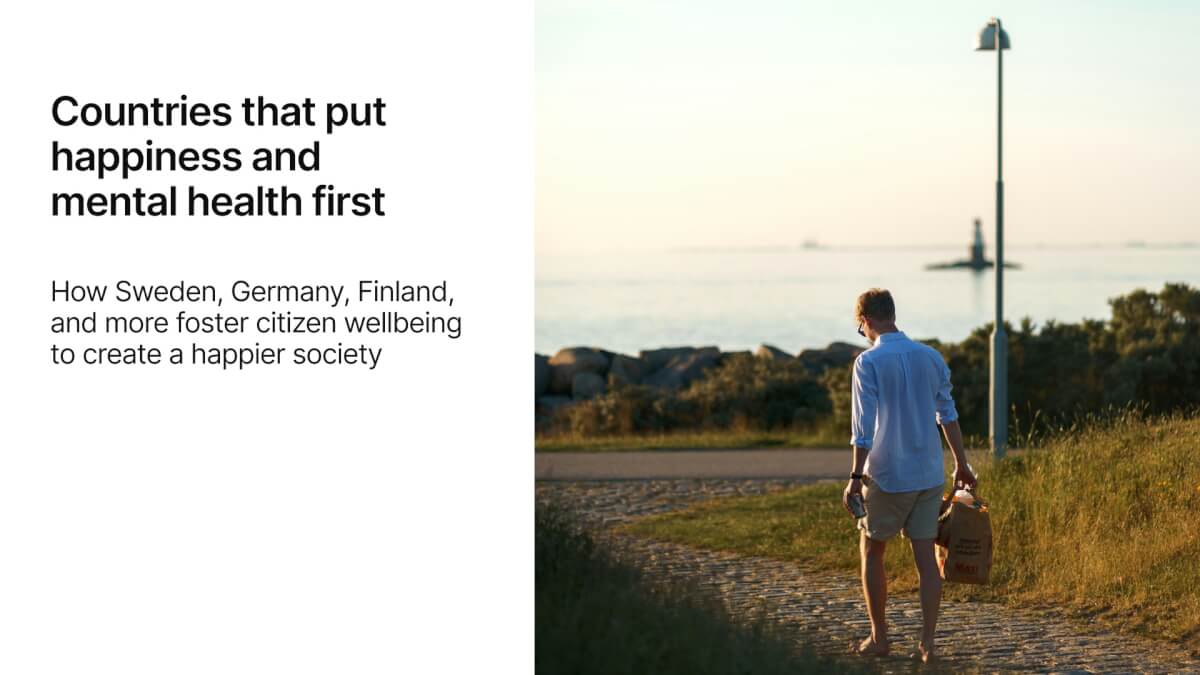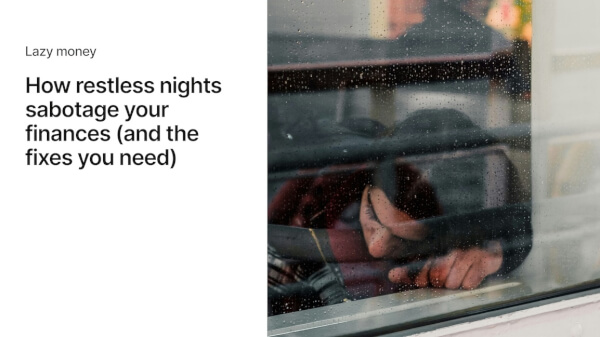Your Christmas Dinner in numbers
Tis the season to eat a lot of yummy food, so Wise has teamed up with the food-and-culture expert and Chef, Mallika Basu as part of our Christmas Without...

WHO recently put together their largest review of world mental health to data (who’s WHO? The World Health Organisation). And back in 2013, all 194 WHO Member States signed up to the Comprehensive Mental Health Action Plan 2013-2030, the goal being to transform mental health care around the world, and create environments where that’s possible.
In the first year of the pandemic, anxiety and depression rates went up by 25%. And that isn’t surprising given that parts of the world with the highest life expectancy, in part, credit this longevity down to community and close relationships. Mental health has never received the level of support it deserves and requires, and there’s still a very long way to go. But, in recent years the importance being placed on improving the resources available to us all has increased.
I’m scared to even type these words but… the World Happiness Report also found that one ounce of good came out of the pandemic;
People doing more for other people, without expecting anything in return. And it’s that support that's proven to positively impact our general well-being and mental health, along with the person receiving it. Love this.
And while community and personal support isn’t just important, it’s imperative, governments need to be doing their bit too.
With that in mind, I’ll be looking at:
Where’d I get my data?
Unfortunately, we can’t kid ourselves here, finances do have a part to play when it comes to mental health. But this isn’t always down to how much you have, but how your mental health and money management, literacy, etc interact. To put it into context, I have ADHD on the severe end of the spectrum which initially made dealing with my finances SOOO anxiety-inducing. Part of ADHD, for me, because it’s a spectrum and not one-size fits all, is struggling to focus on stuff that feels overwhelming or I’m not passionate about. And for some reason I wasn’t passionate about putting together budgeting spreadsheets and opening bank letters. Weird.
You’ll likely notice that the lists are heavily EU focused, and data does vary across different reports depending on what the countries were measured on.
Which is why, before I get knee deep in my listacles, I want to give a shoutout to Sapian Labs who showed that it isn’t all about the money.
They track and explore the evolving brain and mind of humanity through data and their Mental State of the World Report 2022, saw that most of the highest mental health scores came from Latin America, Spain, Africa and some French-speaking countries.
Their scoring isn’t based on working hours, green spaces and government mental health spend, but rather general mental health wellbeing. Taking mood, outlook, the mind-body connection and all that jazz. And this particular report explored over 34 countries.
Here’s their take on why:
"This belies the commonly held belief that national economic prosperity translates to greater social wellbeing, where these correlations would be expected to be positive and not significantly negative. MHQ scores of countries were significantly negatively correlated with cultural indicators such as Performance Orientation and Individualism as well as economic indicators such as GDP and GNI per capita. This stands in stark contradiction to the belief that economic growth enhances societal wellbeing.”
❤️Turns out health is wealth ❤️
But that isn’t to say that finances don’t have a huge impact on our mental and physical state.
Here are a few points on why money and our minds collide from mental health charity and organisation, Mind.
So many factors contribute to relationships with mental health and finances, and I won’t be able to do them all justice, but one conclusion that can be drawn across the board is that the two often go hand in hand, so if you’re about to make a move, it’s good to know where you’ll get the most support.
William Russell analysed a list of OECD countries, the OECD is a forum where the governments of 37 democracies across the world with market-based economies work together to develop policies of a high standard to promote and maintain economic growth.
Out of these countries, they scored them out of ten based on
I’ve combined William Russell’s findings with government information on the mental health support each country offers. I’m aware there are buckets of data out there and different factors have been used to measure results. So take this with a pinch of salt.
Their mental health index puts Sweden at numero uno down to its green spaces and work life balance. Only 1.1% of Swedes work long hours, compared to 12.2% in the UK. That being said, while Sweden scores very highly in most mental health indexes, and the system provides treatment and support by two systems, there are mixed reviews on receiving care for “mild to moderate” mental health issues.
Germans also don’t work long hours with only 4.3% reporting that they do. And the government healthcare system covers 88% of the general population, including low income households. People have access to psychiatrist, therapy, inpatient and outpatient care, medication and emergency services. Having lived there, I can concur that the system is pretty watertight, and work-life balance paired with government support doesn’t go unnoticed.
Finland has multiple nationwide programmes dedicated to preventative and early intervention care and their system also focuses on treatment and rehabilitation. Plus, they rank in first place with greenspaces covering 73.3% of the country, which is proven to contribute to mental well-being.Finland also set up an online Mental Health Hub - as well as physical access to treatment, of course - with therapists of different disciplines. Fabulous.
French citizens have the second highest time spent on leisure and self care and their government spends the most on mental health care. They focus on early diagnosis, support for individuals and loved ones, rehabilitation, and, of course, access to therapists and psychiatrists. The state offers services that are either free or heavily subsidised.
With the lowest percentage of residents working long hours (0.40%), and over half of its citizens working part-time, it’s not surprising that they take fifth place. People have access to help that’s provided by social services and that help is there 24/7, as well as online mental health support for those who can’t make it into a clinic or need urgent help.
Italians spend the most time on self care and leisure devoting more time to family, friends and rest with an average of 16.5 hours. Since the pandemic, mental healthcare has become a priority for the government with access to both free and private help.
The Canadian government recently invested $4 million CAD in the alliance for healthier communities. They have an online portal with educational content, self-guided therapy, peer-to-peer support, individual therapy sessions, regional support as well as crisis support on hand 24/7.
Non-profit organisations, free short-term psychological treatment, online access to help, and in-person treatment too. The healthcare system isn’t completely free, but it’s funded by the state and very well subsidised. Their healthcare system is considered to be one of the best in the world and they’re one of the biggest spenders .
Slovenia’s treatment and care is covered by the government’s national health insurance as well as reimbursement schemes and both in-patient and out-patient treatment is fully insured. Only 4.4% of the population work long hours and 61.5% of the country is green space.
And we’re finishing up on AUS. Australia has put millions towards their mental health services both in terms of treatment and prevention. .The government increased their spending from 2016-2017’s $9.3 to $11.6 billion between 2020-21. In 2022 alone, 860,000 Australians used the government's digital support services and if you go to a public hospital, care is free and if enrolled in a government programme residents can access a variety of support for free
Annnnndd, that’s the end of my listacles. I hope you got something from them ❤️
*Please see terms of use and product availability for your region or visit Wise fees and pricing for the most up to date pricing and fee information.
This publication is provided for general information purposes and does not constitute legal, tax or other professional advice from Wise Payments Limited or its subsidiaries and its affiliates, and it is not intended as a substitute for obtaining advice from a financial advisor or any other professional.
We make no representations, warranties or guarantees, whether expressed or implied, that the content in the publication is accurate, complete or up to date.

Tis the season to eat a lot of yummy food, so Wise has teamed up with the food-and-culture expert and Chef, Mallika Basu as part of our Christmas Without...

Millions of people around the world travel over Christmas, Hanukkah and Kwanzaa. In 2022 alone, 77,000 flights took off on Christmas Day globally. That may...

Salt-N-Pepa the iconic hip hop group = ❤️ love Salt and pepper, AKA the only seasoning I used as a university student = 🥲sigh Taking the Spice Girls advice...

The festive season is upon us, and it’s pretty much the same deal every year: Shop for gifts last minute Eat like a Sumo wrestler in training Travel to see...

We've teamed up with personal finance expert, Kia Commodore to help give your money a kick up the backside so you can go ahead and sleep. “Lazy Money” is what...

We've teamed up with personal finance expert, Kia Commodore to help give your money a kick up the backside so you can go ahead and sleep. “Lazy Money”...